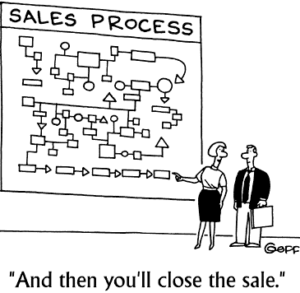According to a report by Forbes Insights, in association with Brainshark, sales coaching and mentoring is cited as the most important role that frontline managers play, according to 74% of leading companies.
But are we really surprised?
This result wasn’t surprising considering the significant impact sales coaching has on performance. Sales reps with 30 minutes or less of sales coaching per week receive win rates of 43%, and those that receive at least 2 hours of coaching per week, have a win rate of 56% (source).
Understanding the importance of coaching is one thing. Doing it right is a different story. Even if sales managers understand the importance of coaching, they usually go about it all wrong or fail to make it the priority it should be. Many organizations offer their managers training to help them coach more effectively. However, more training on coaching does not result in more coaching by managers, for three principal reasons.
1. Over-Complicated Training Processes
 Many sales processes are over-engineered, especially parameters surrounding coaching sessions. This results in coaching sessions having so many steps and sequences that their chances of success in practice are slim. Many sales managers feel that they have no time for coaching to begin with, let alone if the process is tedious. If a manager only has limited time per month for sales coaching, a 10-step program defined by HR and run through the corporate LMS will never be successfully implemented.
Many sales processes are over-engineered, especially parameters surrounding coaching sessions. This results in coaching sessions having so many steps and sequences that their chances of success in practice are slim. Many sales managers feel that they have no time for coaching to begin with, let alone if the process is tedious. If a manager only has limited time per month for sales coaching, a 10-step program defined by HR and run through the corporate LMS will never be successfully implemented.
2. One Size Does Not Fit All
Coaching sessions should focus on the individual. You can’t expect to find a one-size-fits-all coaching approach if you want to see real results. Personalized coaching sessions are the way to maximize benefits, and therefore become a valuable use of a manager’s and rep’s time.
3. Lack of Flexibility
 Lastly, coaching systems can be rigid and not able to adapt to each role, manager, or department’s needs. For example, if a company implements a coaching program focused on how to conduct sales calls, managers may be limited by pre-defined sales motions, call scripts, etc.. There are so many other factors that come into play that may not be easy to focus upon with a rigid coaching system – preparation and research, empathy, questioning skills, and a myriad of other things specific to the individual, team or territory. If managers are forced to” stay within the lines”, they’re most likely ill-equipped to coach in all the other necessary areas for sales success.
Lastly, coaching systems can be rigid and not able to adapt to each role, manager, or department’s needs. For example, if a company implements a coaching program focused on how to conduct sales calls, managers may be limited by pre-defined sales motions, call scripts, etc.. There are so many other factors that come into play that may not be easy to focus upon with a rigid coaching system – preparation and research, empathy, questioning skills, and a myriad of other things specific to the individual, team or territory. If managers are forced to” stay within the lines”, they’re most likely ill-equipped to coach in all the other necessary areas for sales success.
Sales Coaching Best Practices
To successfully implement an effective coaching program, managers need to be trained. And the coaching system needs to be relatable and useful in the context of their day-to-day job.
1. Make it part of everyday activity.
Top-performing managers use an everyday management activity such as activity tracking, forecasting and deal reviews as an opportunity for coaching rather than making coaching an activity of its own. They dig into individual deals and closely examine early-stage deals with their reps, resulting in improved performance across the team. In short, they integrate their coaching sessions with everyday life.
2. Formalize the process and use a system.
Low-to-average-performing managers have on the fly conversations, simply scratching the surface of the pipeline data with reps before moving on. These managers need to be trained to leverage conversations on larger issues to add context and structure to their coaching interactions. Furthermore, many modern sales organizations are reinforcing their sales manager training by investing in sales management systems that have built-in coaching workflows (click here to learn about things to consider while selecting a SaaS provider!)
3. Focus on what matters most.
 Coaching will only be applied consistently when it aligns with all of reps’ key activities, targeting the leading indicators of success. For instance, if a rep needs help prioritizing who to call, then his activity metrics and coaching should align with that. Avoiding the pitfalls listed above and focusing your coaching sessions on individual needs and performance will get you (and your team) on the path towards success.
Coaching will only be applied consistently when it aligns with all of reps’ key activities, targeting the leading indicators of success. For instance, if a rep needs help prioritizing who to call, then his activity metrics and coaching should align with that. Avoiding the pitfalls listed above and focusing your coaching sessions on individual needs and performance will get you (and your team) on the path towards success.
Looking to streamline your coaching processes? Request a free, personalized demo of LevelEleven and see how we can help keep your coaching sessions on track and happening regularly.


